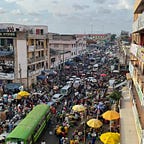Why Africa Informal Economy Index
Africa’s informal economy is huge — it employs 4 out of 5 employees, accounts for about 90 percent of all businesses in sub-Saharan Africa and about two-thirds in North Africa, and contributes to over 40% of the GDP of most African countries. In fact, it is the largest in the world. This is why Justin Norman, founder of The Flip, argues that it’s stupid to call it the informal economy, it’s just the economy of Africa.
Many of the businesses in Africa’s informal economy are micro and small businesses, such as barbershops, salons, mom & pop stores, food sellers. They are usually owned by the manager, not formally registered, are outside the tax systems, and are largely analog.
Over the years, there have been many initiatives and attempts by governments, development finance institutions (DFIs) to transition these businesses into the formal sector. For governments and DFIs, the primary aim is to bring these businesses into the formal sector, get them to report employment and income figures, pay taxes, and grow to fill the Missing Middle gap.
In recent years too, the startup ecosystem has caught the vi. This has been triggered by the massive investments in, and outstanding growth of, dukantech in South Asian countries (especially India and Pakistan) such as Khatabook, OkCredit and Bazaar. The covid-19 pandemic also contributed to this greatly, as many businesses opened up for digital products than ever. I believe this is a welcoming phenomenon, and it holds lots of promise for the growth of the economy.
My aim is to index these investments and report on the progress made in bringing millions of businesses in the informal sector online, using publicly available information.
Though there are various ways of characterizing the informal economy in Africa, for this Index, we will define as:
- owner-owned business with employees of 0 to 9
- minimal formal structure, e.g. not registered, normally pays no taxes, doesn’t have formal employment contracts,
- revenues are $25,000 per year
- usually offline and are coming online for the first time
This Index will focus on reporting statistics from startups that provide the following solutions:
- Bookkeeping & digital ledger: most informal businesses use pen and paper to record transactions.
- Ecommerce & retail: These startups help informal businesses to digitize their supply chain, from buying products from suppliers, listing their products for sale, etc.
- Hiring & Payroll: Apps that make hiring and paying workers easy for informal businesses
- Financial services: From savings, loans, insurance, pensions, and payments in general, these startups help informal businesses to access financial services digitally.
- Edtech: these are digital education tools that are targeted at upskilling and increasing the digital literacy of informal business owners and their workers.
Some of these statistics and reports will be:
- total funding that has gone to digitizing the informal economy space
- the total number of businesses within the economy
- total digital transactions that have gone on within the space
- and many insightful stats within the space.
I hope to learn a tonne from doing this as well as share more about the great digitization going on within the African informal economy. Share with me some companies that are playing within the space so I can add them to my database. Let me also know any ideas you may have on making this project more successful.
